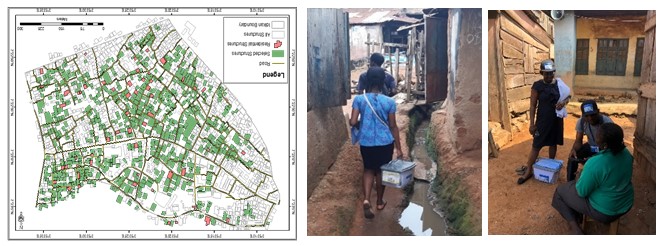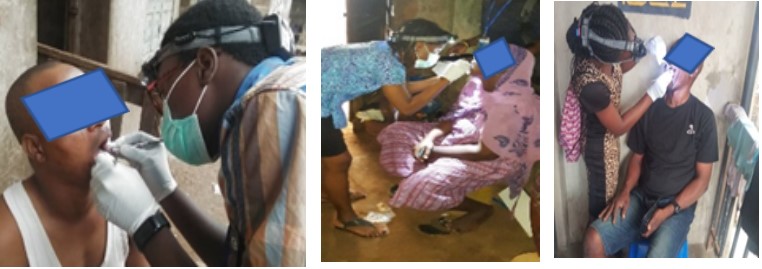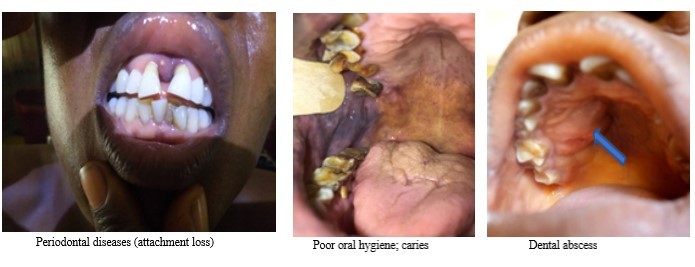
Oral health is a well-recognized key component of the overall health and well-being, yet, suffers neglect in healthcare planning among Low and Middle-Income Countries (LMICs). Oral disease constitutes a silent epidemic, especially among disadvantaged populations such as those living in the slums of LMICs. Slums are characterized by crowded, unhealthy places with a high risk of infection and injury while the residents are often marginalized and have limited access to basic services. Slum settlements provide homes for about 1 billion world population and in Nigeria, the population is estimated to be almost half of the entire country. While research points to a higher general disease burden among slum dwellers, compared to their non-slum urban or rural counterparts, little knowledge exists about the slum dwellers' oral disease burden. An understanding of oral disease distribution and severity in different settings can aid the planning of appropriate intervention strategies.

In conducting the community oral health survey, we combined Geographic Information System (GIS) and Global Positioning System (GPS) software technologies to select representative samples of buildings within the slum and non-slum sites, and OpenDataKit (ODK) software to randomly select households and participants from each building. This is because of the method’s unique advantages in achieving reliable and representative samples, from dense urban areas e.g. slums, when compared to the traditional door-to-door survey of every individual or household unit. The approach is an innovation among oral health studies in LMICs. Oral examination was conducted according to WHO guidelines.

Notable from our findings is that oral diseases are prevalent in both settings, worse in the slum compared to the non-slum with correspondingly higher levels of prompt and urgent treatment needs. Our normative findings have implications for the current oral health policy in Nigeria in the planning of resources and staffing required to meet identified oral health needs as well as targeted therapeutic and prevention strategies by the Community Health Dentists.
A brief biosketch of the lead and corresponding author
 Dr Mary Ebelechukwu OSUH
Dr Mary Ebelechukwu OSUH
(BDS Ib., MPH Ib., PhD Warwick., FMCDS Nig.)
Dr. Osuh is a Community Dentist and an academic staff member of the Department of Periodontology and Community Dentistry, Faculty of Dentistry, College of Medicine, University of Ibadan, Nigeria. She is also a Fellow of the National Postgraduate Medical College of Nigeria (NPMCN) in Community Dentistry. Dr. Osuh is involved in dental research and service provision to underserved populations and disadvantaged communities in Nigeria and has led targeted intervention programmes, research, and student training to various community sites in this respect. Her work experience span epidemiology of common oral diseases, and community dental service uptake and provision with a focus on slum communities. Her other research interests are tobacco use and cessation, oral health inequalities, oral disease surveillance, preschool oral health as well as dental services and utilization. She is also networking with other professionals both within and outside the health industry, bringing different minds together to cultivate better research ideas towards improving the oral health and general well-being of the Nigerian population.
Dr. Osuh undertook her doctoral studies in the NIHR Global Health Research Unit on Improving Health in Slums at the University of Warwick, United Kingdom. As an NIHR academy member, her research is focused on improving the oral health and well-being of slum dwellers. The project was a single-site extension of the multi-country survey that involved Kenya, Pakistan, Bangladesh, and Nigeria, on improving the health of people living in slums, through funding provided by NIHR Global Health Research Unit on Improving Health in Slums using aid from the UK Government to support global health research. She investigated the prevalence and determinants of oral diseases and assessed the oral health care needs of residents of a slum setting, and compared findings to a non-slum setting, in Ibadan, Nigeria. The community oral health survey was designed to provide vital baseline data for researchers and policymakers in Nigeria to design context-appropriate interventions in the study areas. The findings may also be useful for similar settings in Africa and the LMICs where such information is currently scarce.
Please read the full - length article at: https://doi.org/10.1371/journal.pgph.0000297
Newscast Series from the College of Medicine, University of Ibadan (CoMUI),
Translational Research & Community Impact Committee (TRaCC) 0008

